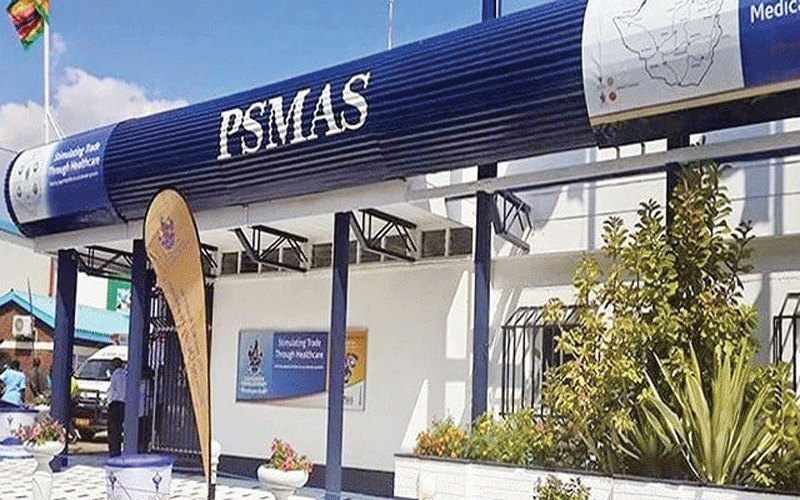
Robby (51) lies on a bed in a public hospital in Harare. A car accident in January resulted in serious leg injuries, and he needed emergency care.
At the time of the accident, Robby, who requested to be identified by only his first name for fear of retribution, believed the civil service insurance, which he and his wife had paid close to 20% of their salary into every month since 1997, would cover his bills.
After spending two days there without receiving emergency care, Robby transferred to a private hospital with the hope of saving his legs.
Robby’s wife, who requested not to be named, says things began on a positive note, only to suddenly change for the worse.
“The hospital required US$900 for admission. They accepted our medical aid [insurance], and we were asked to pay a shortfall of US$350. I was happy he was getting the care he needed and hoped for the best,” she says.
Believing that the US$350 would be all they needed to pay for her husband’s care, Robby’s wife was shocked three days later, when she was notified that they had maxed out their coverage and had a pending bill of over US$1 000.
As costs mounted, Robby’s wife decided to move him back to a different public hospital. By the time they made the move, 10 days later, her husband’s bill had quadrupled.
She negotiated for a payment plan before the private hospital could discharge him.
- Opinion: Corruption a threat to viability of health systems
- PSMI workers sing the blues
- $2,1bn deficit weighs down PSMI
- ‘93% Zimbos have no health insurance’
Keep Reading
“We paid for what we could. At that time, the bills were around $2.8 million [US$3 933], and they wanted their money to be paid up, but we couldn’t manage. There was a day he was not given medication because we hadn’t paid. He spent the day in pain,” she says.
With all the delays and moves, it was too late to save Robby’s legs. He is now recuperating from a double amputation.
Robby’s wife believes that if they’d been able to use their civil service medical coverage, offered by Premier Service Medical Aid Society (PSMAS), as expected, her husband would still have his legs.
“If hospitals like Westend Hospital (one of the providers in their insurance network) were open, maybe he would have received that urgent operation without delays,” she says.
PSMAS and PSMI: a double tragedy
PSMAS was formed in the 1930s to provide health insurance to government employees.
In 2003, PSMAS formed Premier Service Medical Investments (PSMI) to provide affordable medical services. It opened more than 154 medical service centers across the country.
The government offers PSMAS medical insurance to all civil servants as part of nonmonetary benefits.
Although the government covers 80% of the premium for all civil servants, including retirees, under PSMAS, members are not fully benefiting from the scheme as they have in the past.
The issue is twofold: Medical facilities are hesitant to accept PSMAS medical aid, as they are unsure when they will be reimbursed.
There has also been widespread closure of the network of health facilities run independently by PSMI, the investment arm of PSMAS. This was due to lack of funds to keep them running.
Patients are left having to pay significant unexpected shortfalls on their bills — or not getting adequate care.
A gynaecologist who spoke to Global Press Journal on condition of anonymity because he works in the public sector but also runs a private facility, says he doesn’t accept PSMAS medical aid because they do not pay claims in time.
“You can wait a year to receive payment, and the money will not make sense when you get it because of inflation,” he says.
Additionally, the closure of PSMI-run health facilities has worsened the plight of members who depended on those institutions. George Kutoka, the acting managing director at PSMI, says only 11 of the 154 centres were operational in April.
David Dzatsunga, secretary-general of the Confederation of Zimbabwe Public Sector Trade Unions, which represents public workers, says PSMI was established to do away with overreliance on third-party service providers that include private hospitals, doctors and laboratories, among others, because of the high rates they charge.
Unfortunately, the recent closures left civil servants with few options.
“Westend, which was the heart of the health care system in Harare, now resembles a ghost house.
That goes for many other facilities across the country and this gives us sleepless nights,” Dzatsunga says.
Westend Hospital is one of the PSMI facilities that PSMAS members relied on.
When PSMAS worked
When PSMAS was fully functional, civil servants and retirees didn’t have to worry about lacking access to medical care.
Pamhidzai Nyatima, a retired teacher and former member of PSMAS, reminisces about the privileges she enjoyed with her medical aid coverage after joining in 1993.
“During that time, when I got sick, I could get everything in terms of medical care. I underwent two major operations in the ’90s for goiter, and in early 2000s, I had uterus removal but never had any shortfalls,” she says.
For years, Nyatima got medication from government pharmacies in public hospitals using her medical aid coverage.
The 73-year-old has hypertension, glaucoma and arthritis. She requires regular medical appointments and monthly medication for chronic ailments.
Nyatima says her privileges vanished. Now, she has to buy her medication in cash from expensive private pharmacies. When she goes for eye checkups, she is now required to pay US$10 copayment for every visit.
She says sometimes she wishes she doesn’t live too long and become a burden to her children, who already have their own families to care for.
“If I did not have children who help me, I could have been a meal for dogs,” Nyatima says.
“Not getting the cover that I should get really affects me. I am a pensioner. Where do I get the money to buy the medication?” says Nyatima, who requires at least US$35 for her monthly medication.
The insurance program allows civil servants to continue to enjoy benefits of a serving member even after retirement.
The government continues to pay 80% of subscriptions, and the member pays 20% from their pension.
This should cover the member, spouse and three children under the age of 18 or dependents still in high school or university, says Nixjoen Mapesa, PSMAS managing director.
Robby’s wife, who makes US$300 a month, did not anticipate that her family would have to pay high out-of-pocket medical expenses.
According to 2021 World Bank data, across sub-Saharan Africa, one in 12 households spend more than 10% of household income on out-of-pocket health care expenditures. In Zimbabwe, this is one in eight households.
What happened to PSMAS?
In March, representatives from the Confederation of Zimbabwe Public Sector Trade Unions, an organisation that represents civil servants, went before Parliament, requesting an investigation of PSMAS to determine what led to the crumbling of PSMI in mid-December 2022.
“After our intervention, Parliament called PSMAS to explain what is happening,” Dzatsunga says.
Mapesa says PSMAS and PSMI should be understood as independent and autonomous entities.
In response to allegations of the rejection of PSMAS insurance, Mapesa says PSMAS cannot speak on behalf of providers, as they may have varying reasons for whether to accept or deny medical aid cards.
“Over and above facilities under its investment arm, Premier Service Medical Investments, PSMAS works with a network of other service providers.
In the event that our members cannot access service at PSMI, they can make use of any of the service providers on this network.
Our network has more than 1 000 service providers ranging from general practitioners, pediatricians, gynecologists, oncologists, urologists, neurosurgeons, ophthalmologists and opticians who are ready to accept the PSMAS card,” he says.
Global Press Journal called six hospitals on the list and found that what PSMAS covers ranges from 44% to 60% of the cost of care, depending on the type of specialist and procedure required.
Dzatsunga says subscriptions have not been reviewed for a long time and how much is taken out of salaries has remained around US$10, payable at interbank rate, which doesn’t take into account inflation of the cost of health services.
Subscriptions were last reviewed in October 2020, Mapesa says. That year, Zimbabwe’s inflation rate jumped by 560%, and though it has somewhat slowed since then, hyperinflation has led people’s real incomes to plunge.
“Health services are pegged at the parallel market rate, and yet the PSMAS subscriptions are paid in RTGS bank rate. At some point, it would translate to US$5 or US$3. And it would not suffice to cover for all the health care needs,” he says. The rising inflation rate accounts for the price difference, with the parallel exchange rates in Zimbabwe further compounding the issue.
Mapesa agrees that PSMAS has not been spared from challenges affecting the health insurance industry.
The challenges include price disparities between what service providers are charging versus the rates set by the Association of Healthcare Funders of Zimbabwe, a representative body of medical aid professionals that sets the industry’s fee structures. In most cases, service providers charge more than the set rates.
Mapesa also says that service providers index their charges in US dollars and track the parallel market rate. If medical insurers did the same, subscription rates would become astronomically high. The current situation, though, results in subscribers having to pay shortfalls and huge copayments.
Obey Nhakura, former spokesperson for PSMI, says PSMI is facing operational challenges mainly due to cash flow constraints. Nhakura says that the cash flow constraints resulted in staff not being paid and having to leave. “Consequently, less than 10% of our units are operating and attending to patients,” he says.
In November 2022, the government gave $4 billion (US$762 325) to both PSMAS and PSMI to resuscitate operations, with a recent bailout again in May this year that led to the recent reopening of facilities.
A revival of PSMAS
There are promising signs of a PSMAS revival. In early May, the government announced that it will pay its debts and prosecute those found guilty of mismanaging it. But for Robby and others who sought treatment during troubled times for the insurer, this news comes too late. In April, only 11 PSMI units were functional. Kutoka says 70% of the 154 units had reopened as of early May, including Westend Hospital.
Dzatsunga says PSMI belongs to PSMAS, and civil servants are the owners of PSMI.
“The PSMAS model, as far as the health insurance is concerned, is the best model that can accommodate the low salaries civil servants get,” Dzatsunga says.
The health insurance company has over 900 000 members. The majority are civil servants. While the provision of health insurance for civil servants is something that various African countries aspire to, in many instances, it’s logistically challenging and expensive, given the volume of people involved. Premiums for adequate coverage can run high, and this is before factoring in Zimbabwe’s fiscal and currency challenges.
After his predicament, Robby feels there is little difference between a person who has a policy and one who doesn’t.
“The policy is not making a difference in my life,” he says.











